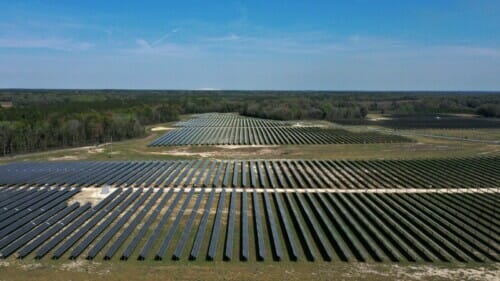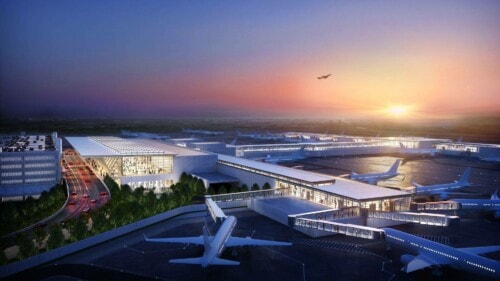Evergy to Lead Group Building Massive KCI Solar Farm Plan Calls for Largest Solar Array at Any U.S. Airport
Published September 13th, 2023 at 5:03 PM
Above image credit: An aerial view of the Florida Power & Light Echo River Solar Energy Center in Wellborn, Florida. The 500-acre solar farm with 330,000 panels opened in 2020 and produces 74.5 megawatts of energy, enough to power approximately 15,000 Florida homes. Kansas City is seeking to develop a solar farm that would generate about seven times as much power. (Paul Hennessy | NurPhoto via AP)Kansas City officials have struck an agreement with a local consortium led by Evergy, the dominant electric utility in the region, to develop a massive solar power generating installation at the new Kansas City International Airport.
Brian Platt, the city manager, told Flatland the project is “big and bold” and will brand the city as a national leader in the fight against climate change.

The city will not own the solar farm but receive $300,000 a year in rent on the land at KCI used for the development, Platt said.
“It won’t cost anything to taxpayers,” he said.
The city does not seek to share in any of the profits from the solar power generated on its KCI land.
“We are not trying to profit off ratepayers,” Platt said. “Our vision and our goals in addition to sustainability is to keep electric rates at or below where they are now.”
The deal was considered and approved Wednesday by the City Council’s Transportation, Infrastructure and Operations Committee, Platt said. Final City Council approval is pro forma and expected next Thursday, he said.
In the first phase, 35 megawatts will be developed on 136 acres at the airport, immediately vaulting the city to a leading role in renewables deployment.
It will be the largest array at any U.S. airport, outdistancing such cities as Denver, whose airport has had solar for many years, according to the city.
After Evergy and the city learn how from this initial deployment, a more ambitious phase two over several years calls for the development of solar arrays on the balance of 3,100 acres identified by the city and its consultants as prime turf for expansion.
“This project could produce up to 500 (megawatts) of electricity, enough to power the equivalent of up to 70,000 average size homes,” the city said in a press release.
“A solar array of this size would be one of the largest solar arrays in the United States. The study recommends a phased approach in order to expedite construction of solar facilities and for those facilities to begin providing energy more quickly,” the city said.
“We are not trying to profit off ratepayers. Our vision and our goals in addition to sustainability is to keep electric rates at or below where they are now.”
Brian Platt, City Manager of Kansas City
The solar project will be developed by a group dubbed the “816 Consortium.”
Evergy would operate the solar power units.
Also in the consortium: Burns & McDonnell, the local engineering powerhouse that was disappointed several years ago when it was not tapped to help build the new KCI terminal; Savion, a local solar and battery storage developer; and Herzog, a local rail and construction solutions company.
“Evergy and the 816 Solar Consortium are excited to be selected for this important and innovative sustainability project. The 816 team is comprised entirely of local companies headquartered in the region and with multiple active projects in Kansas City,” Evergy said in a prepared statement.
“The 816 Solar Consortium share the vision and saw the opportunity to work with our local airport to achieve our regional goals of a sustainable electric grid and a world class, award-winning airport… With our collective project experience and passion for this region, we look forward to getting started and working with the city on this exciting project.”
Platt declined to put a final price tag on the project, saying costs will depend on the exact solar technology that will be used and other variables.
He said he could not identify the project ownership stake of any or all of the members of the consortium.
Final negotiations with the consortium are expected to be wrapped up “in weeks, not months.” Construction on the initial small scale deployment should begin in the first half of 2025, Platt said.
“We are aiming for Kansas City to be a national leader and example of how cities can pursue sustainability goals and transformational improvements,” Platt said.
Martin Rosenberg is a Kansas City journalist and host of the Grid Talk podcast on the future of energy.




